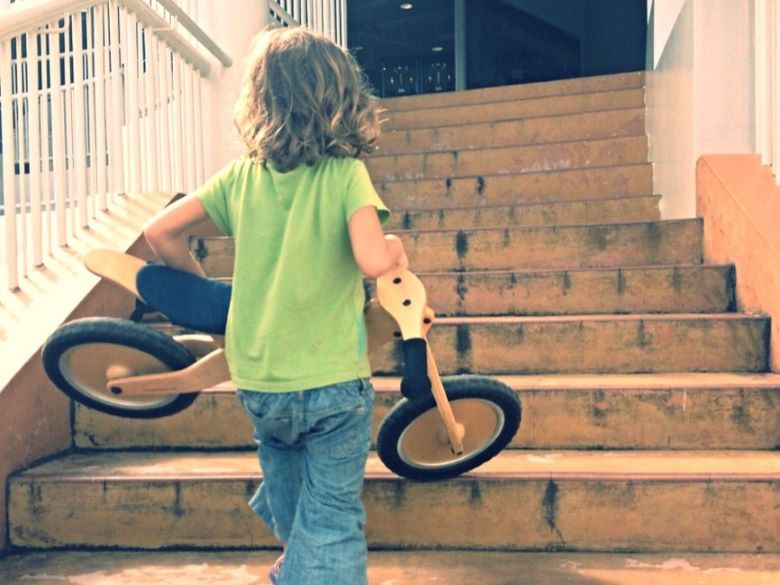This is My commandment, that you love and unselfishly seek the best for one another, just as I have loved you. No one has greater love [nor stronger commitment] than to lay down his own life for his friends. John 15:12-13 (AMP)
Look at how the word ‟love” is used in the passage above. It is not describing a feeling or an emotion. Love is an action word. It is the act of sacrificing yourself in some way for the benefit of others. It seems the first thing to go when a child loses his or her innocence is the ability to love. Not the ability to feel, but the impulse to give sacrificially without thinking about it. I believe this is because kids in our culture are so habituated in the ‟getting” that it never occurs to them to give.
The sooner we teach our kids how to look outside themselves, the easier it will be for us to help them shape their worldview into a view that actually has some WORLD in it.
This is important because if they perceive the world revolves around them, they will assume that to be true until they find out otherwise.

I Can Do It Myself
Another obstacle for kids once they reach their adolescent years is their growing self-reliance. Growing up is inevitable, and becoming more independent is generally a good thing as one gets older.
However, because kids don’t know what they don’t know, it is quite easy for them to get in over their heads when trying to do something themselves.
A child’s “reality” is limited by his or her perception, just as an adult’s is. But the less life experience one has, the narrower their perception.
Children don’t instinctively know the difference between perception and reality, so it isn’t ever going to occur to them to test their worldview. All they know is what they see around them.
Also, because they have not yet mastered their pride, it is not routine for most adolescents to ask for help, even when life overwhelms them. Sometimes, they gravitate more toward the drama of being in a hot mess than solving their problems.
I think this is why it is frequently so difficult for older kids to show love. 1 John 4:19 reminds us that we love because God loved us first. However, unless you know that, you can’t act on it. To live out a life of love effectively, you must allow yourself to be controlled by the Spirit of love.
Now when was the last time you met a teenager who wanted to be controlled by anybody? They are just reaching the stage of life when they can finally do things for themselves. Now we’re telling them NOT to think of themselves, but others? No wonder they get confused.
Which cranks up the drama even more.
Which throws them right back into the cycle of attention-seeking about their plight instead of working toward a solution.

How much patience you have, for instance.” -Franklin P. Jones (lori.e.burleson/flickr)
Grace
We have previously defined grace as unmerited favor, or getting something that you don’t deserve.
One way that we can show grace to others is by simply giving them room to grow. This holds true for anybody, but especially for kids, since growing is their primary function.
It can be difficult for us as adults and parents to remember that kids are a work in progress. They aren’t where we are yet. They lack the life experience to have accumulated the wisdom that we have, and their pre-frontal cortices have not yet fully developed, which renders them inadequate to know what to do with the wisdom that they have acquired.
For this reason, I have often surmised that youth is wasted on the young. Why do they have all the energy with none of the wisdom? It seems that by the time we figure out what we’re supposed to be doing with our lives, we’re too tired to do it!
Of course, we never really stop growing. Our bodies do, but our minds shouldn’t. There is always something new to learn, as long as we don’t shut ourselves off from new learning.
As a parent, I can testify that a lot of the learning I have done in recent years involves learning to BE a parent, which in a lot of ways includes re-learning how to be a child.
We forget, don’t we?
We forget what it’s like to learn one thing and then think we know everything. The days when we used to put paramount importance on what other people thought of us. We forget that we didn’t realize until somebody told us so that the world actually didn’t revolve around us, and even then, we had to be told more than once. For that matter, we forget that we had to be told pretty much everything more than once.
Most of all, we forget all too easily how much we depended upon the approval of our parents.
This is why it is so important to instruct your children gently. Just because they may act as if they know it all, you can’t assume that they know anything you haven’t told them. Or that you’ve told them only one time. Or that you’ve told them multiple times if there was anything in the room with a video screen on it.
And please practice giving your kids room to grow. They’re not going to get things right every time. However, if you don’t encourage them by letting them know that your love isn’t conditional upon their performance, then they’ll just stop trying. Mistakes are learning opportunities for them and teaching opportunities for you.

Awake
Let us then never fall into the sleep that stupefies the rest of the world: let us keep awake, with our wits about us. 1 Thessalonians 5:6 (PHILLIPS)
Technology can be our friend. It created the laptop on which I am writing this, the Internet on which I posted it, the social media whereupon I distributed it, and the device upon which you are reading it. As well as many other more beneficial things, of course.
This same technology, however, can also be our enemy. It robs our productive time, pushes our dopamine buttons relentlessly, decimates our attention spans and erodes our ability to relate to one another. It seems that the more tech savvy we become, the less awake we are to the real world around us.
This phenomenon can affect any generation, of course, but kids today have never known a world without this technology. Texting is as natural to them as breathing. When new tech becomes available that might make the head of someone my age blow up, even the youngest kids adapt to it instantly. It’s as though they were part machine.
What concerns me is that with all this information at the touch of a button (or a voice command—who needs buttons anymore?), an entire generation may be losing its ability to think critically. Anyone can retrieve copious amounts of information off the interwebs, but do they know what to do with it?
It’s bad enough when kids fall for the clickbait. But when the generation that’s supposed to teach them how to make sense of it all is caught up with the rest of the sheeple in the fake news maelstrom, the kids don’t stand a chance.
Love the World
The 21st-century paradox of technology is to be totally connected, yet totally oblivious. This needs to stop.
There is a real world out here with real people in it that have real needs that we were uniquely designed to meet. God can’t draw our attention to these needs if we’re busy taking selfies instead of looking for signs.
Yes, technology is fun. However, the main issue is where, and how intently, we are focusing our attention. We can’t teach our children to be more aware of the world around them if we aren’t. As every parent knows, kids will do what they see us doing before they’ll do what they hear us saying.
It all comes down to self-control, really. Any intelligent adult is capable of prioritizing his or her activities.
But be honest now.
Are you better at planning your work or working your plan?
To an unfocused person (like me), even planning becomes busywork, until the planning process becomes an end in itself. I’m done planning my week, so. . . TIME FOR BINGO TOUR!
Staying awake and alert over the long term requires having a driving purpose or mission. Without a ‟why” to focus on, your mind will drift. Then your body will follow since that is where your mind is located.
Before long, you’ll get to a place where you look at your life and wonder, “What happened to me? How did I end up here?”
And if you can’t figure out how your own life got off track, then how could you expect your kids, who have never had a chance to get their lives ON track, to have any kind of motivation to wake up, rise above the brainwashed masses and have significant influence in the world?
We must be always on our guard against anything that would deter us from our main mission–to love God and love people. For our own sakes, and for the sakes of the kids who are watching us and trying to make sense of their own lives.
They’ll never understand the concept of finding their calling if they don’t first observe what it looks like to seek after it. And they’ll never be able to rise to the occasion if they can’t see that an occasion is taking place right in front of them.
Therefore, it falls to us to be more intentional about being awake and aware. We can’t guarantee that our children will employ self-control just because we model it. It is certain, though, that they won’t if we don’t.
(Even though our kids will do what we do before they do what we say, our words are still important. We´ll talk about that more in part 2. Don´t forget to click on the Free Newsletter link to be the first to know when a new post is up!)

















